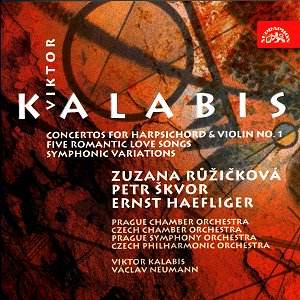Viktor Kalabis studied privately in Prague. He
made his way as a conductor and also recorded for Czech radio
at the Ostrava studios. He has, to date, written five symphonies,
eleven concertos, seven string quartets, two cantatas and a ballet.
Kalabis's music has not travelled outside the Czech Republic so
this generously packed compilation should help spread the word.
The Harpsichord Concerto is
dedicated to the composer's wife whose eminent recordings of the
Poulenc and Martinů concertos have for years been staples
of first the LP catalogue and latterly the CD. Kalabis's concerto
is in three movements. The outer ones have the notes rushing
in pealing relentlessly Gothic torrents with the instrument probably
recorded with much more prominence than you would hear in the
concert hall. No matter. The andante
is full of a wrenching bleakness with none of the Martinů-like
'lift' of the first movement. It steers a course through the same
mindscape as the finale of the Othmar Macha Violin Concerto (on
Arco Diva)
The Violin Concerto starts with awesome
spleen but rapidly establishes itself in Olympian realms. This
is a contemplative kingdom half way between Bax and Rawsthorne.
This continues through the middle movement. The allegro vivace
is almost Walton - almost Frankel. The concerto is dedicated
to the memory of Hana Webrová-Hlavsová who died
under tragic circumstances in 1960. This work has some superbly
lyrical Mediterranean sunset writing - especially in the finale.
Quite a discovery, I should say.
The Largo is the oldest recording
in this anthology - not that it sounds deficient. It is tough
going - not specially dissonant but certainly bleak. The music
retains long lines but it is, overall, a rather fatalistic piece
with little to hold the hope of rising from the gloom. The notewriter
suggests that its negative charge reflected life in a totalitarian
society. Impressive if not endearing is the writing for the horns
of the Czech Philharmonic, the orchestra who commissioned the
piece.
Haefliger was still in incredible voice, steady
and limpidly coloured, in 1977 when he recorded the Five
Romantic Love Songs. These are tense but highly romantic
in the jewelled and glistening manner of Schreker and Zemlinsky
if without quite the complexity of those two composers. They are
not at all difficult and Haefliger is a joy to hear. Listen to
his all-conquering held high note at the end of the penultimate
song, Liebeslied. The booklet
does not give the words although the very good liner notes by
Jiří Pilka give a brief summary of each song. The words were
translated into Czech by the composer and his wife. I can imagine
these appealing to those who have discovered the pleasures
of Geoffrey Bush's (Summer Serenade) and Carey Blyton's
(Lachrymae) songs with orchestra.
I hope that Supraphon will do something similarly
generous and will-informed for Kabelac, Jeremias and other seriously
neglected Czech figures of the last century. They certainly have
the archives to sustain such a venture.
Rob Barnett
